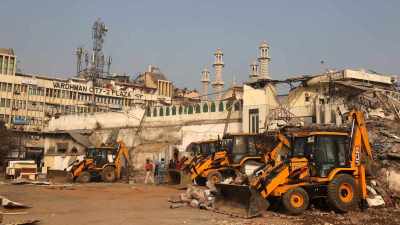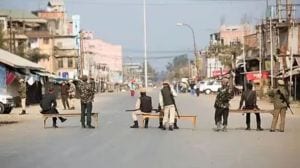Non Resident India
Prime Minister Atal Bihari Vajpayee's interaction with the Indian community in the US focuses attention on an important and continuing cha...

Prime Minister Atal Bihari Vajpayee8217;s interaction with the Indian community in the US focuses attention on an important and continuing challenge to India8217;s foreign policy. How does India deal with the Indian diaspora in different parts of the world in the context of their emotional linkages with India as well as their expectations from it in political and economic terms?
The second half of the 20th century changed the nature and role of Indian communities resident abroad as compared to Indian migrants in the 19th and early 20th centuries. A majority of Indian migrants in the earlier period went as indentured labourers under encouragement from or coercion by the British Government in India. They went to Sri Lanka, West Indies, Guyana, Mauritius, South and East Africa, Surinam, British territories in South East Asia and to Fiji. These were followed by Indians who provided logistical and social support to these migrants colonies. In the early part of the 20th century, Indians started to migrate to the US, Canada and the UK on their own. These Indians were from a different, technically more qualified and professional social background. By the second decade of the last century, the outflow of the first category of Indians came to a complete stop while from the mid-50s, the number of migrants of the second category to UK and the US rose phenomenally. A third category of migrantsare those who went to the countries of West Asia and the Gulf. These were professionals like engineers, administrators, doctors, teachers, skilled workers and chartered accountants. They did not become non-resident Indians because these governments would not give them permanent residence.
By the decade of the 90s, the non-resident Indian communities in UK, Canada and the US had become economically prosperous and politically active in these countries. This category of Indians also got involved in Indian political processes because of their economic clout, political and social connections in India. The prosperous non-resident Indians do not have any demands on the Government of India for protection, political or economic support. They want the Government and the people of India to acknowledge their achievements, give them a role to play in the political processes and economic development of India, and to recognise that they can influence the governments of the countries in which they live.
On the other hand, the first and third categories of Indians seek India8217;s political and economic support as well as intervention, even in countries like Mauritius and Fiji where they form a substantive part of the population. India has been able to evolve an effective response and establish creative linkages with NRIs of the second category living in West Europe and North America. In contrast, it still grapples with the problems of playing a positive and effective role in relation to the Indian communities in the developing parts of the world.
Indian communities in developing countries like those in Mauritius and Fiji, who constitute a sizeable segment of the local population and are major participants in the political process in those countries, are subject to resentments by the local ethnic populations. This is because Indians have proved to be more enterprising, more hard-working, more prosperous. Recent events in Fiji are illustrative of this phenomenon. The elected Prime Minister of Indian origin Mahendra Chaudhary was ousted by a group of thuggish Fijians led by George Speight, a failed Fijian businessman.
The question that agitated public opinion in India is, could India have done something to restore Chaudhary to power. What happened in Fiji was an act of terrorism, ethnic and racial discrimination, the overthrow of a legitimate democratic government and a blatant violation of the Fijian Constitution of 1997. Why is it that the international community, and particularly India, remained inactive?
The reasons given were that any external intervention will intensify the racial and ethnic divide in Fiji, and that it may generate tensions in other countries in the Southern Pacific. These are valid arguments. But whether substantive intervention would have been justified or not has to be looked at in the context of the reasons for the ouster of Mahendra Chaudhary8217;s government. Chaudhary has explained that the main reason why he was overthrown was his refusal to give the contract for the exploitation of forest and timber resources in Fiji to an American company represented by George Speight. Instead Chaudhary allotted the tender to a British firm. He did this despite pressure on his government by the US embassy in Fiji. Chaudhary asserted that the conspiracy against him was masterminded by the former military dictator Rabuka who had overthrown the previous democratic government in the late 80s.
Could India have done something substantive to remedy the situation, individually or in cooperation with other regional powers? Some segments of Indian public opinion advocated direct military intervention. Others have suggested that India should have got in touch with Australia and New Zealand and in consultation with the US, undertaken a joint military operation. Then there has been a school of thought that the matter should have been brought to the notice of the UN Security Council and UN intervention organised.
These suggestions are plausible but their implementation depends and depended on the attitude of the major powers, particularly other regional powers like Australia and New Zealand. Secondly, the logistical requirements of engaging in a military intervention unilaterally are problematic. Thirdly, military intervention would have created unhappy precedents for India given the centrifugal impulses in our country which are both violent and secessionist. The alternative is to impose economic sanctions and to bring up the issue for effective political action at the Commonwealth and in the UN. Fiji8217;s economic relations with India are marginal and India imposing economic sanctions would have only affected the Indian community in Fiji. The only alternative left now is to generate political pressure to restore democratic Government in Fiji and to safeguard the well-being of Indians through multi-lateral fora and bilateral diplomatic moves.
There are obvious physical and political limitations to what India can do in such situations where people of Indian origin are discriminated against. India should become more active, it should be vociferously articulate, in defending the Indian diaspora abroad wherever it is threatened through its undoubted influence in multilateral fora like the Commonwealth and UN.
India still grapples with the problems of playing a positive and effective role in relation to Indian communities in the developing world
ms of playing a positive and eff>
- 01
- 02
- 03
- 04
- 05






























